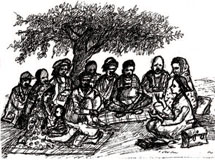Family life education
Family life education is defined by the International Planned Parenthood Federation (IPPF) as 'an educational process designed to assist young people in their physical, emotional and moral development as they prepare for adulthood, marriage, parenthood, and ageing, as well as their social relationships in the socio-cultural context of the family and society'. An effective family life education helps young people to finish their education and reach adulthood without early pregnancy by delaying initiation of sexual activity until they are physically, socially and emotionally mature and know how to avoid risking infection by HIV and other STIs.
Educating adolescents in schools can lay the groundwork for a lifetime of healthy habits; since it is often more difficult to change established habits than it is to create good habits initially.
Important family life education content includes understanding oneself and others; building self-esteem; forming, maintaining, and ending relationships; taking responsibility for one's actions; understanding family roles and responsibilities; and improving communication skills.

Note from the above descriptions that family life education has many things in common with life skills (see Study Session 2 of this Module).
Traditionally adolescents get very limited information on reproductive health topics such as physiology, reproduction cycle, and life skills. Currently in Ethiopia, Family Life Education (FLE) is being taught to adolescents in primary school (from grade 7 onwards) integrated in the natural and social sciences, with reproductive health issues mainly incorporated in biology.